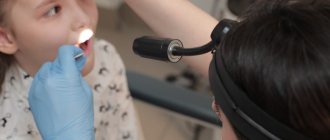Quite often, adult patients turn to an ENT doctor complaining of hoarseness or loss of voice. The condition when an adult develops hoarseness in itself causes difficulties that affect everyday communication or work. Suffice it to recall the singers for whom losing their voice or becoming hoarse is a problem on a universal scale.
If the cause of a hoarse voice or its loss is a cold, then the appearance of hoarseness is quite understandable. But there are times when an adult has no other symptoms (for example, sore throat, fever, weakness). That is, the only discomfort that an adult experiences is a hoarse (hoarse) voice or loss of it. If the patient has hoarseness or hoarseness, and this condition progresses and occurs in an adult with no symptoms of infectious diseases, it’s time to visit an ENT doctor, since the causes of a hoarse voice in an adult are not always associated with colds.
Sometimes hoarseness and loss of voice are a consequence of serious health problems, and not always in the ENT part.
For what reasons can an adult become hoarse or hoarse? How are hoarseness and loss of voice treated? Do I need to give injections, take antibiotics, or do nothing, and the hoarse voice will recover on its own? Or maybe the best remedy for hoarseness is traditional medicine? Let's figure it out! The causes and treatment of a hoarse voice in an adult is the topic of our new article.
Make an appointment right now!
Call us by phone or use the feedback form
Sign up
Healthy voice and hoarse voice: physiology
Our throat has a complex structure. In the throat of any person there is an organ responsible for sound production. This organ is the larynx. It contains muscle folds - the vocal cords. They are very elastic. When an adult is silent, the vocal cords are open and there is a glottis between them. Sound is created when the air exhaled by the lungs passes through the vocal cords and causes them to vibrate and vibrate. If the ligaments are healthy, elastic, and not thickened, the sounds produced will be clear, sonorous, and loud. An adult begins to speak in a hoarse voice when the ligaments thicken and obstacles appear during the passage of the sound wave.
The condition when the ligaments become hoarse is called dysphonia. Loss of voice is called aphonia.
There are many reasons why you may become hoarse or hoarse. Before voicing these reasons, I would like to cite a number of interesting facts about the uniqueness of our vocal apparatus:
- Every adult's voice sounds different. The reason for this is the different length and thickness of the ligaments in the throat: in men they are longer.
- The longer an adult's larynx, the longer his vocal cords.
- The vocal cords in the throat can shorten, stretch, thicken and narrow, making them very elastic.
- Every adult's vocal cords can stretch to ten times their original size.
- You can train the ligaments to stretch, which is what professional singers do regularly when they do special exercises for the throat.
- Animals also have vocal cords in their throats, but only humans have learned to control them.
The voice of an adult is a unique instrument. Therefore, it is important to find out the reasons why he may become hoarse, hoarse, or even disappear altogether.
Symptoms
The symptoms of acute and chronic laryngitis are slightly different from each other. Acute disease is characterized by such symptoms as:
- hoarseness;
- partial or complete loss of voice;
- swelling of the larynx;
- dry mouth;
- sore throat;
- temperature rise to 37-38 degrees;
- cough (at the very beginning of the disease it is dry, but over time sputum appears);
- symptoms of body intoxication (weakness, deterioration in performance);
- labored breathing;
- problems with swallowing;
- dizziness and headaches.
Chronic laryngitis is manifested by symptoms such as:
- sore/tight throat;
- feeling of a lump in the throat;
- hoarseness;
- rapid voice fatigue;
- cough (mostly dry, but sometimes sputum may come out, in some cases interspersed with blood).
With exacerbation of chronic laryngitis, the above symptoms become more pronounced.
Osip voice: reasons
You will not understand how to properly treat a hoarse voice until you establish the cause of this unpleasant symptom.
Among all the reasons, we can distinguish both common reasons that everyone faces, and those that are difficult to even think about, that they can cause an adult to become hoarse or hoarse.
What are the causes of a hoarse voice?
- Infectious diseases of the throat and lower respiratory tract. This is the most common reason why an adult may become hoarse or hoarse. Hoarse (hoarse) ligaments are most often a consequence of laryngitis. Laryngitis is an inflammation of the mucous membrane of the larynx, where the ligaments are located. In addition to hoarseness, laryngitis causes a severe itching of the throat and severe coughing attacks. In the chronic form of laryngitis, the ligaments may remain hoarse (hoarse) throughout life. A person may also become hoarse or hoarse with a cold, which occurs with a cough and complications such as laryngitis, tracheitis or bronchitis. Hoarse (hoarse) ligaments can be the result of another infectious disease of the throat - pharyngitis, when the mucous membrane of the pharynx becomes inflamed. Another common throat disease that can cause your voice to become hoarse or hoarse is sore throat, or acute tonsillitis. In addition to hoarseness, the following symptoms are observed with a sore throat: the throat hurts very much, the body temperature rises, and purulent accumulations appear on the tonsils. Bronchitis, or rather a painful cough that literally “tears” the throat, also makes the ligaments become hoarse. Less commonly, pneumonia and fungal infections can cause hoarseness. Each of these diseases of the throat and lower respiratory tract causes severe inflammatory swelling of the ligaments, which makes the ligaments less mobile, and the previously sonorous voice becomes hoarse, or its temporary loss occurs.
- Chemical poisoning. Substances that can cause an adult to become hoarse or hoarse include fluorine, chlorine, and ammonia. If you do nothing and do not immediately begin to treat the consequences of poisoning, the loss of sonority of the vocal apparatus can become lifelong.
- Burns of the larynx. This category includes both thermal burns and chemical burns (for example, acetic acid or alcohol). Chemical burns are especially dangerous, since in the absence of timely treatment there is a high probability that the ability to speak loudly will be lost, and these consequences will be irreversible, that is, nothing can be done.
- Ligament strain. The problem of hoarse (hoarse) ligaments is familiar first-hand to people who perform a lot in front of large audiences. These are singers, speakers, announcers, lecturers, etc. Treating hoarse ligaments is a priority task in this case. After all, the loss of the ability to sing for a singer, even temporary, can negatively affect his professional activity. What's a singer to do who can't sing? The question is rhetorical.
- Allergy. If a person is hoarse due to an allergic reaction, this can be a dangerous manifestation of Quincke's edema, which precedes asphyxia. Without emergency assistance and treatment, this condition can be fatal. What to do? Call an ambulance as quickly as possible! With an allergy, the throat does not hurt, but a dry cough, watery eyes, and itchy eyes appear.
- Diseases of the endocrine system. Hoarseness can be caused by problems with the thyroid gland.
- Mechanical damage to ligaments. Ligament injuries can also lead to hoarseness. They can be caused by a foreign object entering the throat, as well as during surgical interventions (for example, tracheotomy).
- Neurological disorders. Voice problems can result from stroke, superior laryngeal nerve palsy, recurrent nerve palsy, and other disorders. In this case, the larynx does not hurt, but hoarseness is present.
- Neoplasms. Hoarse ligaments and loss of sonority, especially in the absence of other symptoms (when there are no signs of inflammation and the throat does not hurt), should alert you. After all, one of the causes of dysphonia and aphonia is cancer.
- Tobacco smoking. The tars contained in cigarettes have a bad effect on the condition of the ligaments and provoke chronic laryngitis. In this case, the throat does not hurt, but the ligaments are in a constantly swollen state.
Only a doctor will tell you what to do in each specific case and how to treat hoarse ligaments after the diagnosis has been carried out and the cause of voice disorders has been determined.
Friends! Timely and correct treatment will ensure you a speedy recovery!
Treatment
Help before diagnosis
Targeted therapy is aimed at eliminating the cause of hoarseness. However, this is not always possible to achieve at the pre-medical stage. In the acute stage of inflammation and vocal fatigue, it is necessary to remain silent and avoid contact with any irritating substances.
In cases where hoarseness is associated with a cold, dry heat on the neck area (scarf, salt heating pad), inhalation, and warm gargling help. Any warming procedures are contraindicated when body temperature rises, so you should not self-medicate and postpone a visit to the doctor.
Conservative therapy
Local ENT procedures are indicated for laryngitis, tonsillitis, and phonasthenia. For hoarseness, endolaryngeal instillations of drugs, medicinal inhalations, and procedures using the Tonsillor apparatus are performed. Antiviral drugs, antibiotics, antiseptics and antihistamines are prescribed.
For laryngeal paresis and GERD, etiotropic drug therapy is selected. In cases of severe dehydration and hyperthermia, intravenous infusions of saline solutions are administered. Physiotherapy (electrophoresis, electrical stimulation, DMV therapy), psychotherapy, and IRT contribute to faster elimination of hoarseness. Foreign bodies in the throat must be removed using endoscopic techniques.
Surgery
If there is a threat of asphyxia due to acute laryngeal stenosis, emergency tracheostomy or conicotomy is indicated. The presence of tumors that interfere with normal breathing and voice formation is an indication for their endolaryngeal removal. For malignant neoplasia, resection intervention is required in the amount of hemilaryngectomy, extended or combined laryngectomy.
If the cause of hoarseness is compression of the recurrent nerve by tumor formations, appropriate surgical interventions are performed: thymomectomy, removal of a mediastinal tumor, excision of a retrosternal goiter, etc. For anomalies in the development of the larynx, cicatricial stenoses, various modifications of laryngoplasty are performed.
Phonopedic correction
If hoarseness does not disappear after eliminating the etiofactor, a course of phonopedic classes is prescribed. In speech therapy classes, phonation and voice exercises and speech therapy massage are used. At the final stage, they automate the skills of correct voice production, work on increasing strength, restoring timbre, and expanding the range of the voice. An important role in the prevention of recurrence of hoarseness and the effectiveness of rehabilitation work is played by compliance with the recommendations of a phonopedist on vocal hygiene.
Hoarse ligaments: we treat them correctly!
What can be done if the voice has disappeared due to overexertion, laryngitis or a common cold? Are there any pills for hoarseness? This question is often asked to doctors.
There is only one drug available in pharmacies to restore voice. These are Gomeovox lozenges for hoarseness and loss of voice.
You need to take Homeovox from the first days of the disease, then the medicine will be most effective and will help restore your voice as quickly as possible.
At first, when the sensation in the throat is especially unpleasant, it is recommended to dissolve 2 tablets every hour. Then, as the condition improves, they switch to taking 2 tablets 5 times a day. If you do not violate the recommendations, you will be able to notice a restoration of your voice already in the first days of taking it.
Many teachers, presenters, and lecturers take Homeovox prophylactically. After all, they have a large load on the vocal apparatus and their voice requires increased protection.
What to do if your voice is hoarse and does not recover for a long time? In general, this process is not quick. But, if you do not feel any improvement in your vocal cords for more than a week, you may need the help of a medical specialist.
An ENT specialist treats an adult patient with aphonia or dysphonia. In addition to him, a phoniatrist treats a hoarse voice - this is an ENT specialist of a narrower profile who treats exclusively the vocal apparatus.
If the problem is caused by an infection, in addition to hoarseness, the patient has a sore throat, a cough, a fever, a sore throat is treated with antiviral, antibacterial or antifungal agents. You need to be treated with antibiotics exactly as much as recommended by your otolaryngologist. Even if nothing hurts anymore, interrupting treatment is contraindicated. Incomplete treatment is a sure way to cause complications. The treatment regimen may also include:
- treatment with anti-inflammatory drugs;
- if your throat hurts, antiseptic sprays, lozenges and lozenges are prescribed;
- cough should be treated with antitussives (treatment with cough syrups);
- carrying out inhalations;
- treatment with antihistamines to relieve swelling;
- physiotherapeutic treatment.
But drug treatment must be carried out following certain recommendations. During treatment, you need to ensure vocal rest as much as possible: talk less and do not whisper. Do not eat hot, hard or spicy foods. Such food injures the mucous membrane, and the throat will hurt more. Drink more warm liquids (juices, fruit drinks, compotes, teas).
By following these recommendations, the throat gradually stops hurting, the cough disappears, and the ligaments are restored.
If the issue is an allergy, you need to stop contact with the allergen as quickly as possible, take an antihistamine and, ideally, undergo treatment with an allergist.
If the ligaments hurt from overexertion, you need to undergo quality treatment from a phoniatrist who will select effective exercises. If the ligaments hurt due to strong screaming, complete vocal rest is needed.
A neurologist treats neuralgic disorders; treatment of problems with the thyroid gland - an endocrinologist; tumors often require surgical intervention.
The prescribed treatment regimen depends on the diagnosis and the patient’s condition.
Diagnostics
The appearance of hoarseness requires an immediate visit to an otolaryngologist to determine the cause of the dysphonic disorder. If laryngeal diseases are excluded, in-depth diagnostics may be required with the involvement of other specialists: endocrinologist, neurologist, oncologist.
- Endoscopy.
An instrumental examination begins with laryngoscopy - this makes it possible to detect inflammatory changes in the mucous membrane, the presence of neoplasms, and foreign bodies. In order to assess the function of the vocal folds, the study is supplemented with stroboscopy. If the respiratory tract and gastrointestinal tract are involved in the pathological process, bronchoscopy and endoscopy are performed. - EPI methods.
Electrophysiological diagnostics are indicated for dysfunction of the vocal apparatus caused by neuromuscular disorders. Electroglottography and electromyography are performed. EPI allows you to assess the motor and contractile function of the laryngeal muscles. - X-ray examination.
X-ray diagnostics are mainly required to visualize space-occupying lesions in the neck and chest cavity. If oncological processes causing hoarseness are suspected, X-ray of the lungs, CT of the larynx, and MRI of the mediastinum are prescribed. - Sonography.
To exclude compression of nerve structures by enlarged lymph nodes and tumor conglomerates, an ultrasound scan of the thyroid gland and mediastinal organs is performed. If necessary, a puncture biopsy of detected tumors is performed under ultrasound navigation.
Endoscopy of the larynx
The structure of the speech apparatus, its ability to function
How does sound formation occur in humans, and why can we pronounce individual words, sentences, texts? Speech sounds and their combinations are produced as a result of contraction of the muscles of the peripheral speech apparatus. When a person inhales, the created air flow enters the larynx, creating nerve impulses that in turn affect the vocal cords. Sound production occurs due to the vibration of the vocal cords, that is, they are the main speech instrument in humans, but far from the only one.
Content:
- The structure of the speech apparatus, its ability to function
- Causes of voice loss: why pathology is formed
- Types of aphonia known to medicine
- Diagnosis, recommendations and treatment of aphonia problems
The entire vocal apparatus consists of a central and executive department. The first is the brain: the cerebral cortex, subcortical structures, brainstem nuclei, nerves, pathways. The peripheral or executive department is a system of speech organs consisting of bones, cartilage, muscles, ligaments and peripheral nerves that contribute to the work of these organs in the process of creating and extracting sounds.
The peripheral speech apparatus is divided into the respiratory section (lungs, trachea, bronchi, diaphragm and intercostal muscles), the vocal section (ligaments), and the articulatory section (it is also called sound-producing: soft palate, lips, tongue, lower jaw, teeth, nasal cavity, pharynx , larynx, hard palate).
Each of the listed organs participates in a well-coordinated mechanism for extracting sounds and giving them a certain sound. For example, the strength, timbre and pitch of the voice depend on the movement of the air flow on the ligaments, on its strength and direction. The articulatory organs are responsible for the nature of pronounced sounds, the fullness of vowels, the hardness and clarity of consonant sounds.
What should you not do if you have hoarseness?
If your voice becomes dry, you should reduce your speech to a minimum so as not to strain your vocal folds. If possible, it is better to take a day off from work and get treatment. And, of course, it is not recommended to self-medicate for a long time. If after 1-2 days or more the voice is not restored, you should consult a doctor to clarify the problem.
Smoking and drinking alcohol should be avoided as this can also lead to sore throat. Juices, especially those containing citrus fruits, such as orange and grapefruit, should be excluded from the diet, as should cola, green tea, and coffee. All this provokes mucous membranes and aggravates the situation. Hypothermia and eating cold foods will also worsen the problem. It is necessary to avoid hot, spicy foods that can cause irritation.
Following these simple recommendations will speed up the healing process and voice restoration.
“When your voice becomes dry, you should reduce your speech to a minimum so as not to strain your vocal folds. If possible, it is better to take a day off from work and get treatment. If after 1-2 days or more the voice is not restored, you should consult a doctor to find out the problem.”
Why is hoarseness attractive?
Some people are attracted to a man's hoarse voice because of its sexuality and seems like a treasured key to a woman's heart.
For some, female hoarseness has an attractive power.
For some, a hoarse voice adds reliability, severity and creates a sort of brutal image that one wants to imitate.
And then the obsessive thought “how to make a hoarse voice” haunts you.











